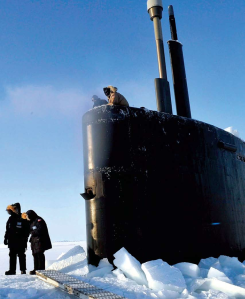Archive for April 28, 2010
CLIMATE CHANGE AND ARCTIC STRATEGIES
Climate Quandary
A Washington think tank is looking into the effects of climate change on U.S. national security and strategic interests. And the Center for a New American Security says in a recent report that the Navy is far ahead of the other services in addressing potential risks posed by climate change.
The report also makes several recommendations to improve U.S. ability to promote national security in the face of a changing climate.
The recommendations include developing U.S. policy on such topics as geo-engineering (intentional manipulation of the climate), the U.N. Convention on the Law of the Seas (commonly known as UNCLOS), nuclear reactors on military bases and making one military command responsible for the Arctic region.
“The Arctic is proving to be the first case study in how climate change affects military missions, and maritime services (the Navy and Coast Guard) are gaining first-hand experience on the impact and complexities that may lie ahead for the U.S.,” according to the 112-page report.
The report says the U.S. Senate should ratify the U.N. Convention on the Law of the Sea (UNCLOS) to protect U.S. and Defense Department interests. The CNAS report also recommends naming U.S. Northern Command (NORTHCOM) as lead command on Arctic issues.
National security experts – including Daniel Kilcullen, the former counter insurgency adviser to Gen. David Petraeus in Iraq – will take part Wednesday (April 28) in a roundtable discussion of the report, including topics such as energy and water challenges in Pakistan and Afghanistan and how they will affect current military operations in the region.
Also speaking at the CSIS event will be Carol Browner, former head of the U.S. Environmental Protection Agency (EPA) and now President Obama’s top adviser on energy and climate change.
The High North
Meanwhile, another think tank – the Center for Strategic and International Studies (CSIS) – is holding a pow-wow on U.S. Strategic Interests in the High North, the area inside the Arctic Circle.
Once blocked by sea ice that made most maritime travel impossible — except for nuclear-powered submarines moving under the ice — the Arctic is believed to hold one-fifth of the planet’s undiscovered petroleum reserves. Now that climate change is melting the sea ice and making the Northwest Passage from the Atlantic to the Pacific a reality, polar countries like Russia, Norway and Canada are jockeying for economic, political and military advantage in the region.
Speakers at today’s (April 28) day-long conference will include government officials and academics from the U.S., Norway, Canada and Denmark. They will discuss issues such as whether the U.S. should develop a separate Arctic policy and what will recent military posturing by Russia and other Arctic states mean for NATO.
CSIS also has a report out on the topic, U.S. Strategic Interests in the Arctic, which also calls for U.S. ratification of the UNCLOS and designating some U.S. agency to take the lead on Arctic strategy. The report’s authors thought NORAD, the North American Aerospace Defense Command — a joint U.S.-Canadian operation — would make a good candidate.
